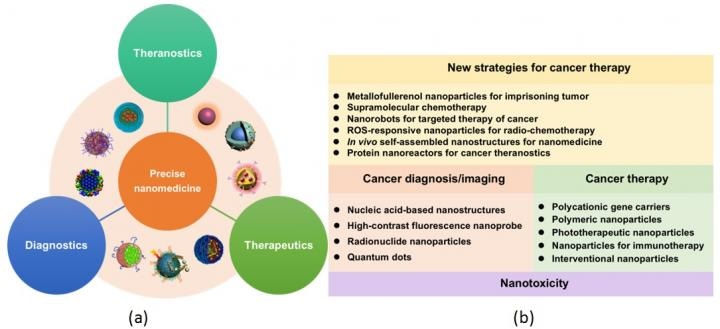Jan 17 2019
One of the leading causes of mortality across the world is cancer, and it is estimated that by 2030, over 21.0 million people may suffer from cancer. There have been several efforts to develop efficient approaches for the diagnosis and treatment of cancer.
 (a) Schematic illustration of precise nanomedicine for intelligent therapy of cancer; (b) various nanoparticles for intelligent therapy of cancer discussed in this review. (Image credit: Science China Press)
(a) Schematic illustration of precise nanomedicine for intelligent therapy of cancer; (b) various nanoparticles for intelligent therapy of cancer discussed in this review. (Image credit: Science China Press)
So far, a range of therapeutic regimes such as molecularly targeted therapy, chemotherapy, radiotherapy, gene therapy, embolotherapy, phototherapy, and immunotherapy have been widely applied to treat cancers in clinics. In order to enhance the clinical performances with less harmful side effects, the nanomedicine has recently been investigated as a promising approach to offer a novel diagnostic or therapeutic regime aimed at precise cancer therapy, as confirmed by successful developments of commercial products like Abraxane and significant formulations in clinical trials.
In a latest review reported in Science China Chemistry, 20 Chinese professors, including Professor Yuliang Zhao from the National Center for Nanoscience and Technology, Professor Weihong Tan from Hunan University, and Professor Xi Zhang from Tsinghua University, establish the most recent advances in precise nanomedicine for intelligent cancer therapy (Scheme 1).
Specifically, they emphasize promising approaches such as supramolecular chemo-therapy, DNA nanorobot, and metallofullerenol nanoparticles, as well as investigate ways to gain sufficient insights into the structure-function relationship of these nanoparticles with regards to cancer imaging, therapeutic applications, and nanotoxicity. In addition, they discuss the difficulty and prospect of certain scientific and engineering problems.
This research was supported by the National Natural Science Foundation of China.
Source: http://www.scichina.com/